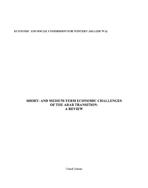The Arab region’s public deems a strong economy to be as important as a well-functioning democracy. Thus, a successful transition process in the region – leading to sustainable, pro-growth, equitable and inclusive nations – requires the hand-in-hand implementation of both economic and political reforms. However, there is still a research gap on the economic challenges of the Arab Countries in Transition (ACTs), which makes it difficult to design sound and effective policies in this area. Based on an extensive literature review and an overall assessment of the region, this paper examines these challenges as well as the opportunities created by the transition process in the short and medium term. It also presents a series of recommendations tailored according to the particularities of the region.
The ACTs each have specific social and political environments. Nevertheless, they share some economic characteristics: negative growth rates, low private investment, scant job creation, high dependence on subsidies and deep-seated corruption. Transition governments must, therefore, identify avenues through which to address these economic issues while satisfying the expectations of as many internal groups as possible. This become particularly complex, as in most ACTs domestic savings are scarce, national markets are small and fragmented, and endogenous technology is relatively weak. In this context, contestability, access, participation and accountability acquire a central role, for the region is faced with an agenda of governance-based reform. In the short term, the challenge lies in initiating and sustaining economic reforms that demand strict measures and sacrifices for the prospect of future gains unlikely to reach the whole population. In the medium term, efforts move towards assuring that the burden of the reforms are fairly spread and the transitions, hence, are socially and politically acceptable.
This study found that transition to democratic and accountable governance favours long-term pro-poor reforms and sustainable development. GDP growth tends to reach higher rates after a downturn in the initial post-transition phase, following a J-shaped curve. ACTs must aim to undergo as short as possible a down phase, which can be achieved through economic and trade diversification, integration in the regional labour market, an improved investment climate, financial deepening, broadening of the tax base, more efficient public service delivery and better targeted social policy. It was also found that links between democracy and economic growth are weak, which indicates that transition to the former does not automatically lead to the latter. This is a long, gradual process, in which governments should try to capitalize on synergies of various reforms. The research concludes that governance reform is critical to transition, whilst inflation stabilization and market institution reforms provide the support for a sustainable economic transition.






